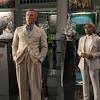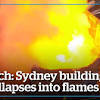'I won't miss the weight': Jacinda Ardern opens up on her life in politics

There's a hallway on Parliament's first floor where the portraits of former prime ministers hang. It goes back to the very first New Zealand colonial secretary, Henry Sewell. There you can see images of Geoffrey Palmer, Michael Joseph Savage, Jim Bolger or John Key.
"For a while there, there was this gap in the portraits," former Prime Minister Jacinda Ardern says.
"And I used to think, 'that's where they're going to put me. But then they closed it up because it looked a little ominous.
"But I did think about that, walking down that hallway. One day I'll be finished, and the only thing that will remain is that picture and how I made people feel."
She whispers the answer to the next question - how did you make yourself feel?
"Tired," she says.
Jacinda Ardern will give her valedictory speech in Parliament tomorrow night. Today, she sat down with 1News chief correspondent John Campbell to discuss the highs and lows of her leadership, and what she thinks of the hatred against her.
She said she had "not one" regret about being the prime minister.
"Are there things I would have done differently? Of course, if you cant reflect back in that way then you're never learning."
She said even upon winning an historic victory at the 2020 election, the job was relentless.
"The weight of the job was so constant and so immediate that even in those moments of celebration, the responsibility was always there.
"I carried that quite heavily, and for good reason - there was a lot at stake."
She said political polarisation and "fractured debate" which was more prevalent now than in 2017 was "not unique" to New Zealand.
"Issues around vaccination was the example we had at that time and it was incredibly difficult. It would be one of the hardest experiences I had - seeing that we had lost, for a time, that sense of unity, that sense of community.
"I will forever think back, is there a way we could have kept that cohesion? There may have been but we may have lost other things and the other things we may have lost would have been people.
"Ultimately what we were trying to do is just make sure that people were safe. And I kept telling myself, looking out that window, that's what they think they're doing too.
"In their heart of hearts, everyone thought they were doing the right thing by New Zealand but it led to a strongly-held view and in some cases - in some cases - built around falsehood.
"For me the challenge is how do we learn from that? How do we deal with wider issues like disinformation? How do we remember that we're human and that regardless of whether we agree or disagree with one another, we are still humans."
She said polarisation and vitriolic debate was not representative of her experience of politics overall, but there was "a small group who hold some very extreme feelings" about her.
"When I look back on my five years in office, my memory isn't of being treated poorly or being attacked or feeling unsafe.
"My memories are of the women who randomly, from nowhere, just made me a cup of tea at the airport. The people who pass notes down a plane to just encourage me to keep going, the random strangers who keep sending me flowers, even since I've left, just to tell me they appreciated me, and the screeds of letters I get from kids.
"Were there people who wished me harm? Yes. Did I feel like, at any moment, that I was at risk? I felt well cared for."
She said that behaviour was unacceptable but that didn't mean people could not disagree.
Ardern said the foundation of debate had to be based on fact.
She said the more extreme hatred was sometimes motivated by people who believed she was doing "horrific things".
"The growth of conspiracy theory, it's a dangerous and difficult thing but we have to find a way where we know that our children, who are going to face screeds of information in the future, how do they determine fact from fiction?"
Ardern said she didn't know if it was exacerbated by her being a woman.
She said she was wary of leading a debate on the role of misogyny in politics, though it was a worthy one.
"It could easily look like I'm trying to make excuses for things that I should be accountable for."
'I did not leave because I felt that I was being given too much of a hard time'Ardern said criticism did not factor into her decision to step down as prime minister and out of politics.
"I did not leave because I felt that I was being given too much of a hard time.
"When you're in politics, you know that you're going to butt up against people who disagree... it's as it should be."
She said her "utterly open and honest" reason for quitting was because she had nothing left in the tank.
"I knew there's what you can plan for, and your agenda... and then within a short space of time, bam, domestic terror attack, volcanic eruption, a pandemic, an economic crisis.
"I know that to do this job well, you have to have a lot of stamina and energy, and then some - for what you're not prepared for.
"I wanted to keep going, I wanted to be able to finish my term because that's what I ran for, but I knew in doing it that I would have to commit to another three years and it was that three years that I could not hand-on-heart stand up in front of New Zealanders and tell them that I had enough left.
"I was honest with myself, but also honest with the people that elected me."
Asked if her stepping aside was at all motivated by improving Labour's election fortunes, Ardern said it was primarily about a lack of energy but she had also considered her departure could lower the temperature in political discourse.
"If it did, that would be good for New Zealand.
"I knew I was a flashpoint for some people, and again that wasn't the basis of my decision, I hoped it would a consequence of my decision."
"When I've watched on I've felt like, yeah, I feel like I was right, and it was the right decision, for lots of reasons."
Muslim community's "incredible generosity" towards New ZealandersArdern said she had a lot of "vivid" memories about March 15.
"Hands down those memories that are strongest for me are all the ones that involve members of our Muslim community - just their incredible generosity in that totally traumatic time.
"Their generosity towards New Zealanders was just extraordinary and my stand-out memory of the entire time."
She was briefed on the terrorist's manifesto.
"I just remember feeling rage. Because it was so clear that this person had come to New Zealand to try and create a sense of other to members of our community - and I just remember feeling angry.
"That's where that sentiment around 'they are us' - that was its starting point for me."
She called Grant Robertson and asked him to take notes for her and help the team write a statement for a press conference.
"He tells me that's where I first used that phrase, was on the phone [to him]."
The notes from that press conference is going to Te Papa.
'We did make a difference'Ardern said she felt she had done "exactly" what she set out to do as the leader of a government.
"Government isn't just what you do, it's how you make people feel.
"We did it differently. You wouldn't often hear, I think, five years ago, kindness used as a trait in leadership - not often anyway. But now I hear it and that's very gratifying to me.
"When you have significant aspirations and they're on issues as significant as child poverty, inequality, climate change - if after five years you say, job done, then you weren't trying hard enough.
"The job is not done, but I feel very proud of what we did in the time I was here."
One of those things was the Child Poverty Reduction Act, she said.
The Act had three and ten-year targets and required annual reporting on child poverty indicators - meaning future governments would be held to account on those metrics.
Ardern said in five years, despite an economic crisis, the Labour Government continued to make progress on child poverty, as well as low unemployment rates, lunches in schools which helped low income families, lifted benefit incomes by more than $175.
"We finally reversed those benefit cuts of the 1990s and to preserve it into the future, we've indexed benefit rates against wages."
She said it was important policy change was not a "flash in the pan" or easily reversible by future governments.
"We did make a difference."
She said she tried to communicate what co-governance in the context of water management was, including that it was a model to "used for a number of years" being replicated.
"In some cases it was simply mischaracterised.
"What is our goal? Our goal is that people can safely drink their water. Our goal is that our kids can safely swim in their ocean. Our goal is that we don't see escalating costs for people.
"Why be afraid of having Māori at the table?"
Ardern was also adamant New Zealand would meet its emissions targets.
"Five years probably felt more like nine. Just because of what we all went through as a nation.
"But I will miss the people. I'll miss having a reason to go and speak with schools or to meet with people doing incredible things. I'll miss my colleagues, they're wonderful people. I just think New Zealand is so lucky, the people who work in the public service are incredible.
"But I won't miss the weight, because it is heavy."


 New Zealand
New Zealand Argentina
Argentina  Australia
Australia  Austria
Austria  Brazil
Brazil  Canada
Canada  Chile
Chile  Czechia
Czechia  France
France  Germany
Germany  Greece
Greece  Italy
Italy  Mexico
Mexico  Nigeria
Nigeria  Norway
Norway  Poland
Poland  Portugal
Portugal  Sweden
Sweden  Switzerland
Switzerland  United Kingdom
United Kingdom  United States
United States 
























